Blockchain: The Revolutionary Platform for ALL Industries
The blockchain is a cryptographic breakthrough first used in the genesis cryptocurrency, Bitcoin, and invented by Bitcoin creator Satoshi Nakamoto. In this article, we'll explore the blockchain's rise, and go through many possible applications of this life-changing technology,
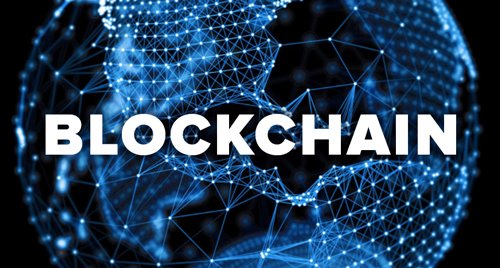
Blockchains allowed all types of data to be stored in a distributed ledger, but a common misconception is that blockchains are only meant for digital cryptocurrencies. Instead, blockchains can be used for literally any industry. This article will be divided into these sections:
- What is Blockchain?
- The Popularity and Rise of Blockchain
- Blockchain in All Industries
Let's get started!
What is Blockchain?
In late 2008, an entity going by the pseudonym (replacement name) "Satoshi Nakamoto" invented the first digital cryptocurrency: Bitcoin. However, in the Bitcoin whitepaper and behind the code of Bitcoin lies a fundamental data structure, which Nakamoto called the "blockchain."
Blockchains are digital distributed ledgers. Let's break this definition down:
- A ledger is a chronological collection of data; in the case of cryptocurrencies, ledgers would contain transactional data (e.g. "Alice pays Bob 5 Bitcoins").
- Digital means that all the work is done by computers. This is important, as it minimizes the chance of human error.
- Lastly, "distributed" means that the system is not controlled by one entity; rather, it's decentralized. This means that the ledger is located on thousands, if not millions, of computers all over the world.
There's no one entity controlling the ledger, and there isn't one server or computer a hacker could attack to kill the blockchain. This makes it basically impossible to take over or otherwise attack the blockchain.
However, the word "blockchain" itself is a compound of two underlying words: 'block', and 'chain.'
- "Blocks" are the single unit in the distributed ledger. Each block contains a certain amount of transactional data, and the blocks are ordered chronologically. In the case of Bitcoin, new blocks are created by the network every ten minutes.
- The "chain" refers to how the blocks are connected together. Blocks are mined by the community and are added to this chronological ever-growing ledger. However, each block contains a "hash" or a sort of electronic signature of the last block.
This means that if an attacker wanted to attempt to change a block, he would also need to change every single block after that block, due to the chaining nature of these hashes. The crucial importance of the blockchain is that it's basically impossible to hack it, alter it, or change it in any way.
Additionally, due to its decentralized nature, there's no one point of failure to attack. This means the blockchain is virtually invincible to every type of threat. And that's why this revolutionary invention is so popular; it allows for accountability built-in to the system, and no trust is required from humans at any point in time.
Popularity and Rise of Blockchain
Now, let's take a look at the popularity of blockchain, and see how it rose so far to get to where it is today.
Below is a graph from Google on blockchain's search popularity over time:
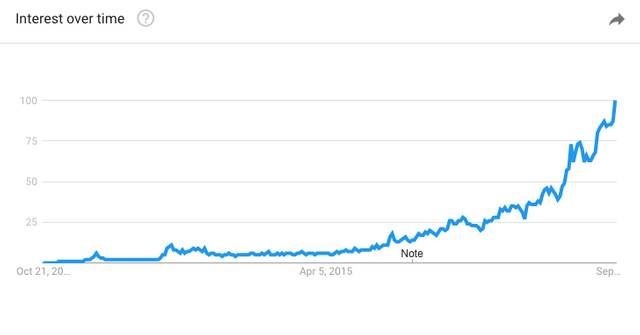
The graph is relative, meaning that the numbers on the left side are percentages of its maximum popularity. For example, right now the term "blockchain" is at 100%, meaning it's at peak popularity. It's never been as popular as it is right now.
Another insight is that one year ago, blockchain was less than a third as popular as it is right now. Five years ago, blockchain was over a hundred times less popular as it is right now. It's pretty clear from looking at the graph that blockchain's popularity is only increasing.
To the right is a graph from Aite Group showing estimated market capital spent on blockchains. Their estimates are already quite large (hundreds of millions), and the positive correlation is clear. Blockchains will only continue to grow in popularity in the future, as more companies and organizations decide that it's right for them. But what industries can utilize blockchains?
Blockchain in All Industries
Blockchains can be utilized in all industries. Below, I'll go through a few popular industries and summarize how blockchains can be used in that industry.
Government
There are many facets of government that are centralized, which could lead to unwanted corruption.
Blockchains can add decentralization and accountability to these governmental sectors.
For example, voting could be done in a much more secure way using a blockchain. This would lead to a completely tamper-proof, decentralized, and transparent voter network leading to virtually zero voter fraud.
Blockchains can also help organize governmental data, from personal identity data to criminal backgrounds. This can help officials easily access a distributed database of secure information.
Laws and Justice
In the judicial industry of lawyers and legal contracts, blockchains could prove vital to maintaining accountability and trust. The Ethereum Blockchain is a live, working example of "smart contracts," which are contracts that automatically execute by themselves on the blockchain.
Smart contracts could be used to track ownership, transparently publish terms and conditions, and even facilitate disputes without a human judge getting involved. Blockchains could also store a tamper-proof, public and transparent copy of the law. Every time an update or amendment to the law is made, a transaction could be published on the blockchain.
In the current society, many citizens are unaware of the law and leave that up to lawyers and politicians. If the law were posted on a blockchain, it would be very easy for every citizen to access a public copy of the law and hold lawmakers and senators accountable.
Education and Jobs
For employers reading resumés or colleges selecting applicants, it's imperative for reviewers to find out all the academic details of the applicant.
However, currently there isn't a good system for managing transcripts and academic scores, leading to colleges contacting hundreds of services for results.
Using a public, transparent blockchain could ease all of these problems by hosting a tamper-proof copy of all educational data. Users can share their data (in the form of a blockchain entry) to their employer or college, and easily prove their knowledge.
Transportation
As computers get more powerful and technology gets more refined, the self-driving car will become the future of driving and transportation. However, for self-driving cars to work efficiently, they will need to communicate with each other.
Self-driving cars will need to quickly transmit their location and position data to other self-driving cars around them. This way, each self-driving car can compute an obstacle-free path minimizing collisions and crashes.
The easiest and decentralized way to facilitate such data is to use either a blockchain or a tangle. The "tangle" is another type of distributed ledger invented by the makers of the IOTA cryptocurrency (you can read about it here), with the main feature of the tangle being the possibility of lightning-fast micropayments and nano-transactions.
Food and Supplier Tracking
Centuries ago, all food consisted of basic natural substances like vegetables, fruits, and meat. However, in this day and age of artifically-produced food, there's no easy way to keep farmers accountable for growing organic or healthy crops, and to keep companies from adding unhealthy substances to food.
The easiest way to keep everyone in the food supply chain accountable would be to use a decentralized blockchain. The blockchain could track where each ingredient in a food item came from, and how it was grown. This would ease pressure on farmers and help the public better understand what they're eating.
Conclusions
To conclude, the blockchain is a revolutionary ledger technology first used in the cryptocurrency industry, but it doesn't have to stop there!
Blockchains can be used for an unimaginable amount of applications, and can provide many new and exciting improvements.
Usage of a distributed ledger can keep users accountable, facilitate smart contracts, organize large batches of data, and keep data transparent to the public.
With blockchain's growing rise and popularity, I think it's safe to say that blockchain may soon become the revolutionary platform for all industries.
Thanks for reading,
— @mooncryption
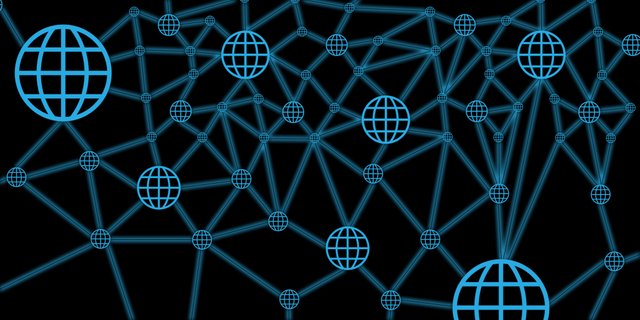
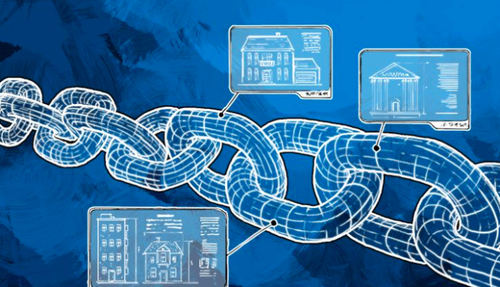
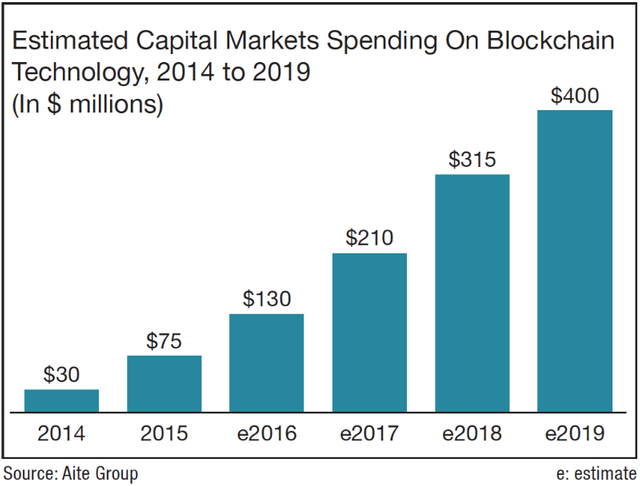
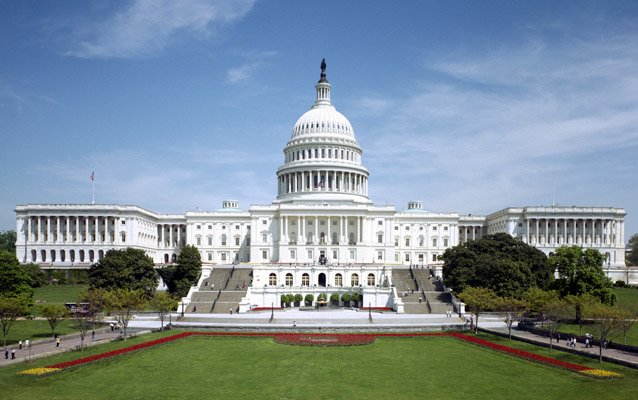


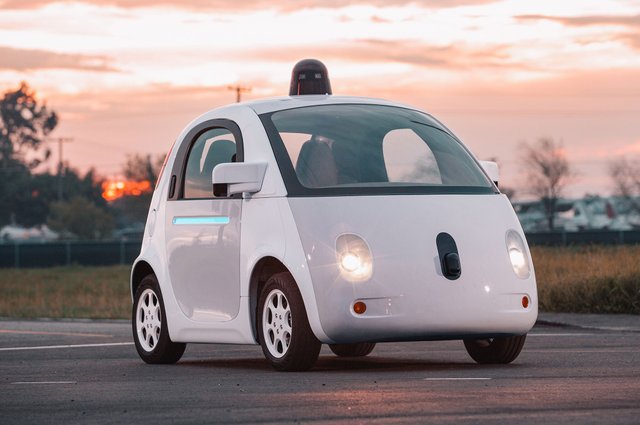





This post was resteemed by @resteembot!
Good Luck!
Curious? Check out:
The @resteembot users are a small but growing community.
Check out the other resteemed posts in resteembot's feed.
Some of them are truly great.
This post was resteemed by @resteembot!
Good Luck!
Curious? Check out:
The @resteembot users are a small but growing community.
Check out the other resteemed posts in resteembot's feed.
Some of them are truly great.
You were lucky! Your post was selected for an upvote!
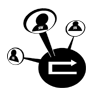
Read about that initiative
img credz: pixabay.com
Nice, you got a 6.0% @minnowbooster upgoat, thanks to @mooncryption
Want a boost? Minnowbooster's got your back!
The @OriginalWorks bot has determined this post by @mooncryption to be original material and upvoted it!
To call @OriginalWorks, simply reply to any post with @originalworks or !originalworks in your message!
For more information, Click Here!
Special thanks to @reggaemuffin for being a supporter! Vote him as a witness to help make Steemit a better place!
government IS corrupt.
they'll fight to REMAIN corrupt...tooth and nail.
Awesome Post !
We are seeing more and more blockchain tech moving into other industries and it's wonderful. Great write up.
Thanks!